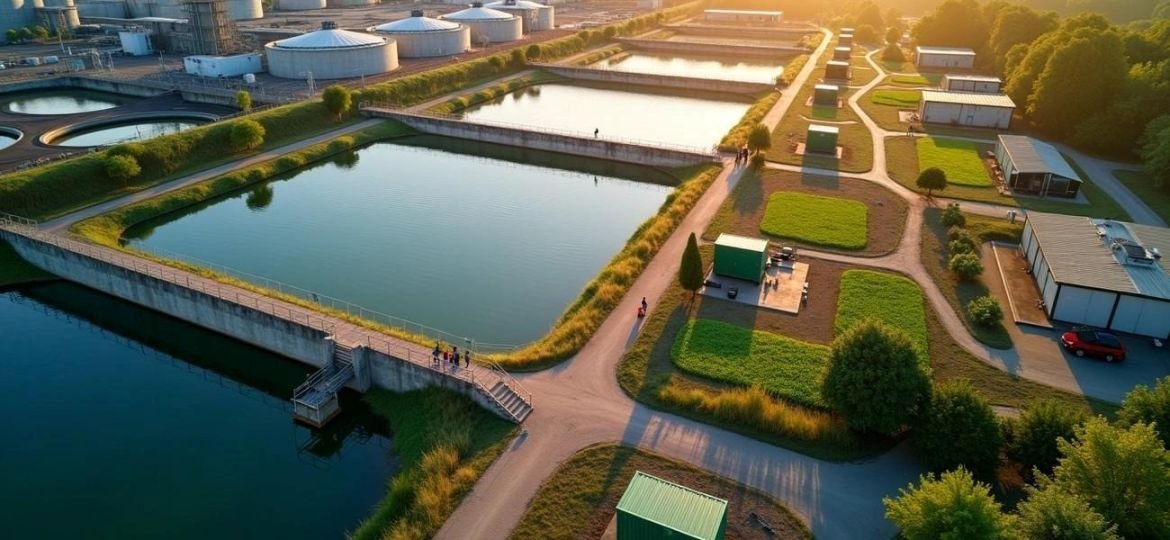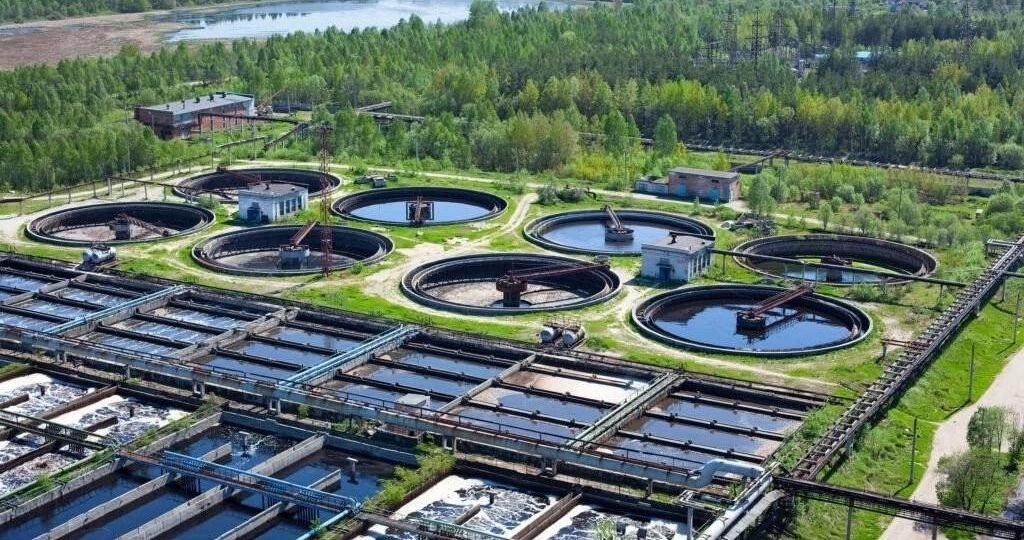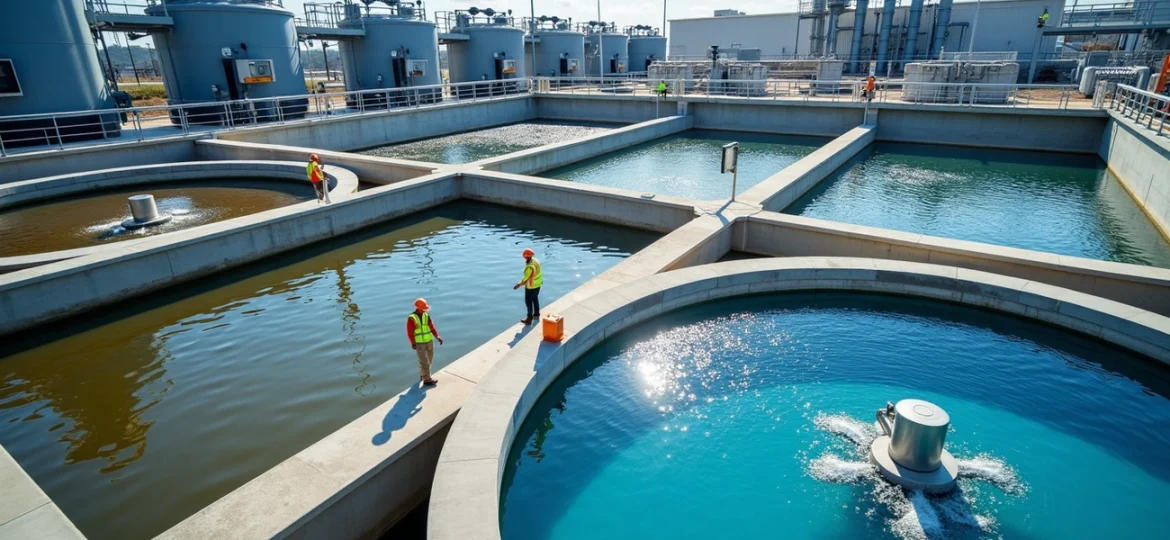Water is one of the most precious resources on Earth, essential for all forms of life. However, growing urbanization, industrial activities, and improper waste disposal have significantly polluted water sources. This is where wastewater treatment plants (WTPs) play a vital role in protecting the environment and ensuring access to clean and safe water. In this blog, we’ll explore what a wastewater treatment plant is, how the wastewater treatment process works, and why it is crucial in reducing water pollution and promoting environmental sustainability.
What is a Water Treatment Plant?

A water treatment plant (WTP) is a facility designed to remove impurities, contaminants, and harmful substances from water, making it suitable for various uses such as drinking, irrigation, industrial processes, and safe discharge into the environment. These plants use advanced technologies and processes similar to the sewage treatment plant process to treat raw water, which could be sourced from rivers, lakes, groundwater, or even wastewater.
Key Processes in a Water Treatment Plant
Coagulation and Flocculation
These are the initial steps where chemicals are added to raw water to bind particles and impurities, forming larger clumps called flocs.Sedimentation
The flocs settle at the bottom of a tank, leaving cleaner water on top.Filtration
The water passes through layers of sand, gravel, and activated carbon to remove smaller particles, microorganisms, and pollutants.Disinfection
Chemicals like chlorine or ultraviolet light are used to kill any remaining bacteria, viruses, and other pathogens.Advanced Treatments (Optional)
Depending on the end use, additional processes like reverse osmosis, ion exchange, or ozone treatment are applied.Sludge Treatment
The collected sludge from sedimentation is treated and disposed of safely, ensuring minimal environmental impact.
Importance of Water Treatment Plants

1. Preventing Water Pollution
Untreated water containing industrial chemicals, sewage, and agricultural runoff is a major source of water pollution. WTPs remove these contaminants before the water is released back into natural water bodies, safeguarding ecosystems.
2. Providing Safe Drinking Water
Water treatment plants ensure that the water supplied to households and businesses meets quality standards, protecting public health from waterborne diseases like cholera and typhoid.
3. Promoting Sustainable Water Use
Recycling and reusing treated wastewater for irrigation, landscaping, and industrial applications reduce the strain on freshwater resources.
4. Protecting Aquatic Life
By treating wastewater, WTPs prevent harmful substances like heavy metals and chemicals from entering rivers and oceans, ensuring the survival of aquatic organisms.
5. Supporting Economic Development
Clean water is essential for industries, agriculture, and urban development. WTPs ensure a reliable water supply, contributing to economic growth while minimizing environmental damage.
How Water Treatment Plants Combat Water Pollution
Water pollution arises when harmful substances are introduced into water sources, making them unfit for consumption or ecological balance. The role of water treatment plants is critical in combating this problem:
- Efficient Wastewater Management: Properly treated wastewater can be reused, reducing the need to draw fresh water from natural sources.
- Reduction in Toxic Discharges: Industrial wastewater often contains hazardous chemicals. WTPs remove these toxins, preventing contamination of rivers and groundwater.
- Encouraging Environmental Conservation: By ensuring that treated water is safely released, WTPs protect wetlands, rivers, and marine ecosystems.
The Role of Wastewater Treatment Plants in Preventing Water Pollution
While water treatment plants focus on purifying raw water for safe consumption, wastewater treatment plants (WWTPs) are equally critical in preventing environmental pollution. Wastewater generated from households, industries, hotels, and institutions often carries harmful contaminants such as organic matter, chemicals, and pathogens. If discharged untreated, this sewage can pollute rivers, lakes, and groundwater, leading to severe health hazards and ecological damage.
A wastewater treatment plant processes this sewage through physical, biological, and chemical methods to remove pollutants before releasing the treated water back into the environment. In India, the Central Pollution Control Board (CPCB) has made it mandatory for housing societies, factories, and commercial complexes above certain capacities to install sewage treatment plants (STPs).
Key Benefits of Wastewater Treatment Plants
Pollution Prevention: Stops untreated sewage from entering natural water bodies.
Water Reuse: Treated wastewater can be recycled for gardening, flushing, cooling towers, and landscaping.
Compliance with Regulations: Ensures adherence to CPCB and state pollution control board discharge standards.
Public Health Protection: Reduces the risk of waterborne diseases caused by contaminated water.
Sustainability: Contributes to water conservation and supports the circular economy.
Modern Solutions: Packaged Wastewater Treatment Plants
Traditional concrete-based STPs require large spaces, long construction times, and high operational costs. Modern alternatives like packaged wastewater treatment plants offer a more efficient and eco-friendly option.
SUSBIO ECOTREAT, for example, is a prefabricated, plug-and-play sewage treatment system built with fiber-reinforced plastic (FRP). It combines anaerobic and aerobic treatment in a compact design, reduces power consumption by up to 90%, operates silently without odor, and meets CPCB discharge norms. This makes it ideal for residential apartments, industries, hotels, schools, and hospitals looking for a reliable and cost-effective wastewater treatment solution.
Conclusion
Water treatment plants are indispensable in the fight against water pollution. They play a pivotal role in conserving the environment, ensuring the availability of clean water, and supporting sustainable development. Primary sewage treatment is often the first step in this process, effectively removing solids and organic matter to reduce environmental impact. With increasing awareness about the importance of water treatment, governments, industries, and communities must invest in advanced water treatment technologies to mitigate the growing threat of water pollution.
Protecting our water today means securing life and the environment for future generations. Let’s make every drop count!
Frequently Asked Questions
Q1. What is the difference between a water treatment plant and a wastewater treatment plant?
A water treatment plant purifies raw water from sources like rivers or lakes to make it safe for human consumption. A wastewater treatment plant (STP/WWTP) treats sewage and industrial effluents to remove pollutants before discharge or reuse.
Q2. Why are wastewater treatment plants important for preventing water pollution?
Wastewater treatment plants stop untreated sewage and chemicals from polluting rivers, lakes, and groundwater. They remove harmful contaminants, ensure compliance with CPCB norms, and help protect public health and the environment.
Q3. How much does a wastewater treatment plant cost in India?
The cost depends on capacity and technology. Small 10 KLD packaged plants cost around ₹2.5–3 lakhs, while larger 500 KLD plants may cost ₹5–10 crore. Installation typically adds 15–40% to the total project budget.
Q4. Can treated wastewater be reused?
Yes. Treated wastewater can be reused for non-potable applications such as gardening, flushing, cooling towers, and landscaping. Modern systems like SUSBIO ECOTREAT help maximize water reuse, reducing fresh water demand and saving costs.
Q5. What makes packaged sewage treatment plants a better option than traditional STPs?
Packaged STPs are prefabricated, compact, and require minimal civil work. They install faster, consume less energy, and operate odor-free compared to traditional STPs. Solutions like SUSBIO ECOTREAT also provide plug-and-play setup, IoT-enabled monitoring, and CPCB compliance.







2 Comments
[…] 0 By Akshat Tyagi Latest Blogs December 2, […]
[…] yet its availability and quality are diminishing due to pollution, overuse, and poor management. Water treatment plant (WTP) play a vital role in ensuring that this precious resource remains safe and usable. In this […]